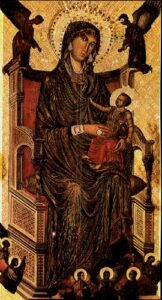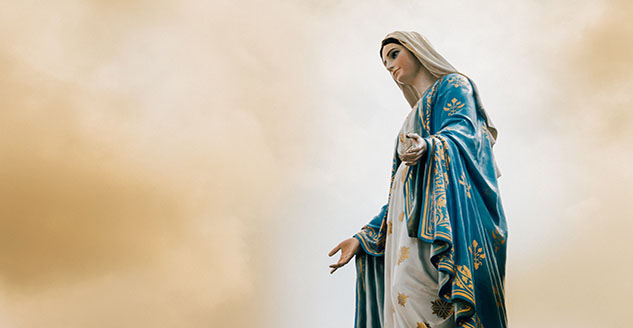In the mountains of southern Italy, there is a monastery that shelters the iconic twelve-foot high Black Madonna icon of the village of Montevergine, attracting pilgrims from all over the world for hundreds of years. On February 2nd and September 12th–the feast of the Purification of Mary and the feast of the Most Holy Name of Mary, respectively–a festival takes place in celebration of Montevergine’s Blessed Virgin. Travelers from all walks and ways of life climb the 300 plus steps up the mountain to the hilltop monastery–singing, dancing, playing tambourines and drawing parade floats along the way–to adore, pay homage, pray to and praise in thanksgiving of Our Lady of Montevergine’s love.

The miraculous history of the Black Madonna throughout the world shows a long, loving history of the Blessed Virgin Mother watching over her children wherever she has appeared. Many miracles have been attributed to these iconic images, including the Polish icon of Our Lady of Czestochowa–known and revered as the queen and protector of Poland–and Our Lady of Montevergine specifically is believed to have interceded in the miraculous rescue of a gay couple in the middle ages who were en route to worship before her icon, but were captured by an angry mob and were beaten, stripped, tied up and left to die in the frigid temperatures.
Such incredible moments in history have led millions of people to look to her as their spiritual mother and source for guidance and motherly comfort, but her life on earth itself is a testament to motherhood’s strife and sacrifice, while showing the loving path for mothers all across the world.
Throughout the month of February we’re celebrating, focusing and worrying about love and finding love, and it’s almost insulting that we neglect to celebrate and acknowledge the love that moms bring to us and the world, literally with every breath they take. But many young women today feel a sense of fear at the prospect of struggling with motherhood, especially if they lacked a positive mothering experience growing up. Others may fear what the commitment entails or feeling that they may not become the great mother they had.
“It’s a commitment,” said Fr. Robert Presutti, Chaplain at Divine Mercy University, “meaning you are sort of throwing yourself into the unknown. You can’t determine what this child is going to be like in any way, shape or form. How is having a child going to impact your own life? It’s a risk, and like all risks, we face it with a little hesitation.
“You think about beings that are just ‘gimme, gimme, gimme’,” Presutti continued, “and don’t have much to give back. What more than babies, right? But at the same time, you realize they’re giving a whole bunch, that we didn’t even realize we needed. Very often, it’s in our own coming out of ourselves and our own false securities that we discover true happiness, true security, and the joy of sacrifice, especially in motherhood.”
But we only need to look at Mary, not only for her guidance and understanding, but also to help imitate any mothering skills that fall short. As we sing her praise, we may forget that Mary was human too. Mary was a real woman on earth who faced the very same fears and struggles mothers do today. She was a wife and mother who committed herself to doing all of the things that a great parent does: preparing and cooking meals, washing and mending clothes, washing dishes, changing diapers, worrying about her child as he matured, and going to bed exhausted after each long day of hard work caring for her husband and son.
“There is certainly a lot to contemplate,” said Presutti. “She is a humanly mother, like all other mothers but, perhaps, like no other mother. And talk about making yourself completely vulnerable! God was asking a lot of Mary, and Mary threw herself into it. The only question she had for the angel who appeared to her was in regards to God’s expectations for her and it would all come about. Everything else was unknown and an absolute risk. And Mary allowed herself to be shaped very deeply by her child. A child inevitably shapes the mother.”
Mary’s actions on earth exemplified the virtues of a loving mother–acceptance, patience, trust, endurance, courage, and strength. She said yes to carrying God’s only son–a request that was not only daunting but also unheard of–and stayed true to her promise with her beloved child unto the very end: from giving birth in a stable, to fleeing to Egypt to protect her newborn, to standing with her son as He grew up, and being with her son where no mother ever wants to be: in His final hours, watching in horror as He was condemned, brutally tortured and executed before her eyes.
“With God’s grace and Mary’s example,” said journalist and author Marge Fenelon in her book, Imitating Mary: Ten Marian Virtues for the Modern Mom, “we can overcome any obstacles to becoming the loving, wonderful mothers we’re meant to be. In Mary, we have a mother worthy of emulation, but who is fully human with the same experiences and emotions we have. In her life, we find example, and in her virtue, we find inspiration. Mary can show us how to be the mothers we want to be — the mothers we can be.”
Becoming a mother can be one of the most joyous moments a woman will experience in her life, and the love she feels for her child far outweighs the challenges that they may face in their future. It is not an easy journey, but Mary’s example sheds light on the path to overcome the fears and obstacles to becoming loving mothers.
“Whenever God acts in our life,” said Father Presutti, “He always applies those aspects: there’s sacrifice, and there’s a bliss to it. Whatever God does for us, He makes it a gift to others as well. The gift that God gave to Mary was highly personal and individualized to Mary, in a way only in which He could do. And through Mary that gift is a gift to every one of us.”

